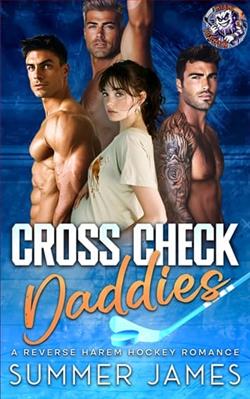Page 126 of How to Walk Away
In a way, it was.
Years before, I’d seen a video taken by a security camera that went viral on the Internet of some kids playing on a beach where they weren’t supposed to be. The tide came roaring in, and the three of them got pulled into the waves. The beach was long and flat. Watching it, you just rooted for them to stand up, get balanced, and run back up to higher shore. But the tide was so strong, they couldn’t get their footing. They just washed out to sea and then back in, over and over. They started to stand and then tumbled backward, lifted their heads for a good breath and got pummeled by a giant wave, tried to outrun the waves and were overtaken. You thought, “Those kids are going to drown five feet from dry land.” In fact, even though you knew they weren’t going to drown—because the title of the video was “Miracle of Survival”—you felt certain they were going to drown anyway.
That was me, during those early months after leaving the hospital. I was all three of those kids at the same time. A miracle of survival—but drowning anyway, all the same.
My old friends wanted to see me, for example, but I didn’t want to see them. They wanted to “get together” and “grab a bite” or “have coffee.”
Why would I want to do that? I dreaded the pity on their faces and the assumptions they’d make. I dreaded how sorry they’d feel for me. I dreaded every single reaction of every single girlfriend when she heard how Chip had ruined my life and disappeared. I wasn’t going to feed their schadenfreude.
My mother read an article saying it was important for “people like me” to stay connected. She even tried to convince me to let her organize a girls’ day at a spa. “It’ll be fun,” she tried to declare. “We’ll get our hair done. Mani-pedis. You can roll home feeling great.”
“I never feel great, Mom,” I said. “That’s not a feeling in my collection.”
“I just read an article that said human connections help prevent Alzheimer’s.”
“Alzheimer’s,” I said, “is the least of my worries right now.”
I tried not to feel bleak, but I felt bleak anyway. I tried to leave the house, but I always stopped at the door. I tried to count my blessings, but even just trying made me mad. Things went on like this for months—and months. No change in sight. I don’t mean to gloss over it, but there just isn’t much to report. Wake up. Feel angry. Avoid human contact. Smash dishes. Repeat.
And then, in late summer, Kit came home for a weekend.
Twenty-five
YES, KIT’S BOYFRIEND,the Moustache, had let the Beauty Parlor fall apart. Yes, things were far worse than she’d expected when she got back. Turns out, he had no interest in the boring, day-to-day activities of running a shop, like sweeping or taking out the trash or writing down appointments. Kit returned to angry customers, disgruntled employees, and a cockroach infestation.
We hadn’t talked on the phone every day, as she’d promised—though she had found time to talk every day with my mom.
It was fine. My mom needed her more.
“If you’d just follow me on Instagram,” Kit said, “we wouldn’thaveto talk on the phone.”
“It’s really not the same thing.”
Kitty had the most contact with our dad of anyone, so she and my mom suddenly had a lot to talk about. They also had years of resentments, misunderstandings, disappointments, and blame to work through. But I had to hand it to them. They didn’t just smile big and make nice. They went for it. They argued, they disagreed, they compared notes—on their lives and everybody else’s.
When we did talk, though, Kit was very interested in my health, my progress, my daily routine. She asked tons of questions—sometimes so many we never talked about her at all. Specific questions, too, about how I felt and how I was taking care of myself. She started emailing me articles on spinal health, recovery, home rehab, functional electrical stimulation, and neurogenesis. Specific, highly technical articles, too—far different from the pop psychology we’d started with.
“Where are you finding these?” I asked her. “I thought you were repainting the shop.”
“I broke up with the Moustache,” she confessed.
“Because he drove your business into the ground?”
“Because I think I’m in love with Fat Benjamin.”
“We’re all in love with Fat Benjamin. He’s adorable.”
“Anyway, I have insomnia.”
“Donotworry about me in the middle of the night!” I said. “Go back to sleep!”
“Nobodychooseswho they worry about in the night,” she said. “Just read the articles and shut up.”
So I did. Or tried to. Actually, I just printed out most of them and put them in a stack. They were very dry. My guess was Kit herself only read the titles.
All to say, she’d hoped to visit in early summer, but she didn’t make it until August. Which was fine. I wouldn’t have been much fun before that anyway.
I wasn’t much fun in August, either.















